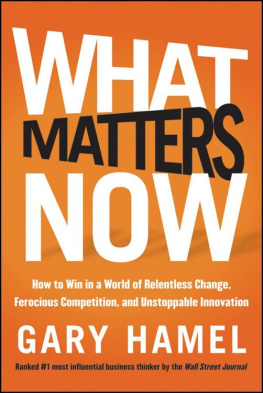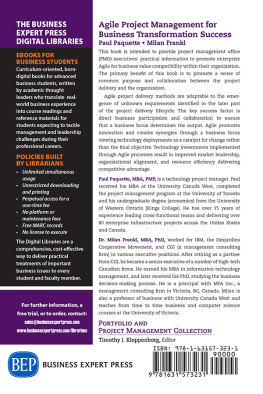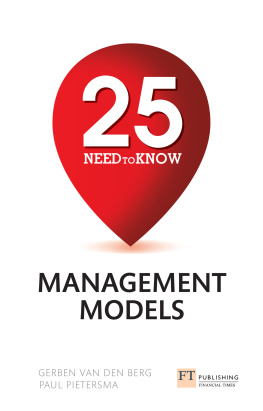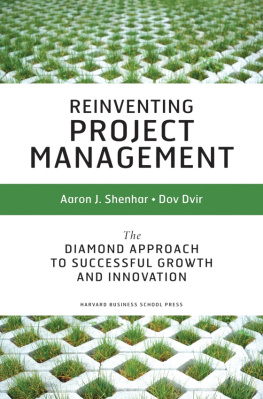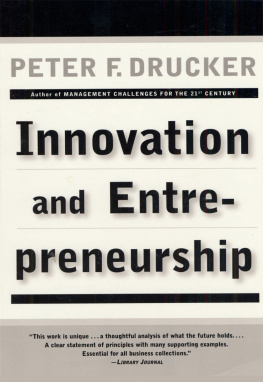
Copyright
Copyright 2007 Gary Hamel
Al rights reserved
No part of this publication may be reproduced, stored in or introduced into a retrieval system, or transmitted, in any form, or by any means (electronic, mechanical, photocopying, recording, or otherwise), without the prior permission of the publisher. Requests for permission should be directed to permissions@hbsp.harvard.edu, or mailed to Permissions, Harvard Business School Publishing, 60 Harvard Way, Boston, Massachusetts 02163.
First eBook Edition: October 2007
ISBN: 978-1-422-14800-6
This book is
dedicated with gratitude to
Eldona Hamel,
Vern Terpstra,
and
John Stopford,
for reasons they know well.
Contents
Copyright
Preface
Acknowledgments
PART I: WHY MANAGEMENT INNOVATION MATTERS
1: The End of Management?
2: The Ultimate Advantage
3: An Agenda for Management Innovation
PART II: MANAGEMENT INNOVATION IN ACTION
4: Creating a Community of Purpose
5: Building an Innovation Democracy
6: Aiming for an Evolutionary Advantage
PART III: IMAGINING THE FUTURE OF MANAGEMENT
7: Escaping the Shackles
8: Embracing New Principles
9: Learning from the Fringe
PART IV: BUILDING THE FUTURE OF MANAGEMENT
10: Becoming a Management Innovator
11: Forging Management 2.0
Notes
About the Authors
Preface
On Christmas eve, 1968, the Apollo 8 command module became the first human-made object to orbit the moon. During its journey back to earth, a ground control ers son asked his dad, Whos flying the spacecraft? When the question was relayed up to the homebound crew, astronaut Bil Anders replied, I think Sir Isaac Newton is doing most of the driving now.
Like that curious lad, Id like to pose a question: Whos managing your company? You might be tempted to answer, the CEO, or the executive team, or al of us in middle management. And youd be right, but that wouldnt be the whole truth. To a large extent, your company is being managed right now by a smal coterie of long-departed theorists and practitioners who invented the rules and conventions of modern
management back in the early years of the 20th century. They are the poltergeists who inhabit the musty machinery of management. It is their edicts, echoing across the decades, that invisibly shape the way your company al ocates resources, sets budgets, distributes power, rewards people, and makes decisions.
So pervasive is the influence of these patriarchs that the technology of management varies only slightly from firm to firm. Most companies have a roughly similar management hierarchy (a cascade of EVPs, SVPs, and VPs). They have analogous control systems, HR practices, and planning rituals, and rely on comparable reporting structures and review systems. Thats why its so easy for a CEO to jump from one company to another
the levers and dials of management are more or less the same in every corporate cockpit.
Yet unlike the laws of physics, the laws of management are neither foreordained nor eternaland a good thing, too, for the equipment of management is now groaning under the strain of a load it was never meant to carry. Whiplash change, fleeting advantages, technological disruptions, seditious competitors, fractured markets, omnipotent customers, rebel ious shareholdersthese 21st-century chal enges are testing the design limits of organizations around the world and are exposing the limitations of a management model that has failed to keep pace with the times.
Think about the great product breakthroughs over the last decade or two that have changed the way we live: the personal computer, the mobile phone, digital music, e-mail, and online communities. Now try to think of a breakthrough in the practice of management that has had a similar impact in the realm of businessanything that has dramatical y changed the way large companies are run. Not easy, is it? And therein lies the problem.
Management is out of date. Like the combustion engine, its a technology that has largely stopped evolving, and thats not good. Why?
Because managementthe capacity to marshal resources, lay out plans, program work, and spur effortis central to the accomplishment of human purpose. When its less effective than it could be, or needs to be, we al pay a price.
What ultimately constrains the performance of your organization is not its operating model, nor its business model, but its management model.
Hence this book. My goal is to help you become a 21st-century management pioneer; to equip you to reinvent the principles, processes, and practices of management for our postmodern age. I wil argue that management innovation has a unique capacity to create a long-term advantage for your company, and I wil outline the steps you must take to first imagine, and then invent, the future of management.
Having said a few words about what this book is about, let me comment briefly on what its not about. While there are plenty of examples and anecdotes in the pages that fol ow, this is not a compendium of best practices. Its not fil ed with exhortations to go thou and do likewise. Frankly, todays best practices arent good enough. Even the worlds most admired companies arent as adaptable as they need to be, as innovative as they could be, or as much fun to work in as they should be. My assumption is that when it comes to the future of management, youd rather lead than fol ow. So this is a guide to inventing tomorrows best practices today.
Neither is this book one persons vision for the future of management. While I wil point you to what I believe are some of the most promising opportunities for reinventing management, Im humble enough to know that one persons imagination and foresight are no substitute for those of a multitude. So rather than try to sel you my point of view about the future, I want to help you build your own. If you want an analogy, imagine a course in entrepreneurship where the instructors goal is to teach you how to create a kil er business plan. Wel , my goal is to give you the thinking tools that wil al ow you to build your own agenda for management innovation, and then execute against it. I can be a coach and a mentor, but in the end, the vision must be yours.
Nevertheless, I do have a dream. I dream of organizations that are capable of spontaneous renewal, where the drama of change is unaccompanied by the wrenching trauma of a turnaround. I dream of businesses where an electric current of innovation pulses through every activity, where the renegades always trump the reactionaries. I dream of companies that actual y deserve the passion and creativity of the folks who work there, and natural y elicit the very best that people have to give. Of course, these are more than dreams; they are imperatives. They are do-or-die chal enges for any company that hopes to thrive in the tumultuous times aheadand they can be surmounted only with inspired management innovation.
So this is a book for dreamers and doers. Its for everyone who feels hog-tied by bureaucracy, who worries that the system is stifling innovation, who secretly believes that the bottleneck is at the top of the bottle, who wonders why corporate life has to be so dispiriting, who thinks that employees real y are smart enough to manage themselves, who knows that management, as currently practiced, is a drag on success andwants to do something about it. If thats you, then welcome.
Next page

